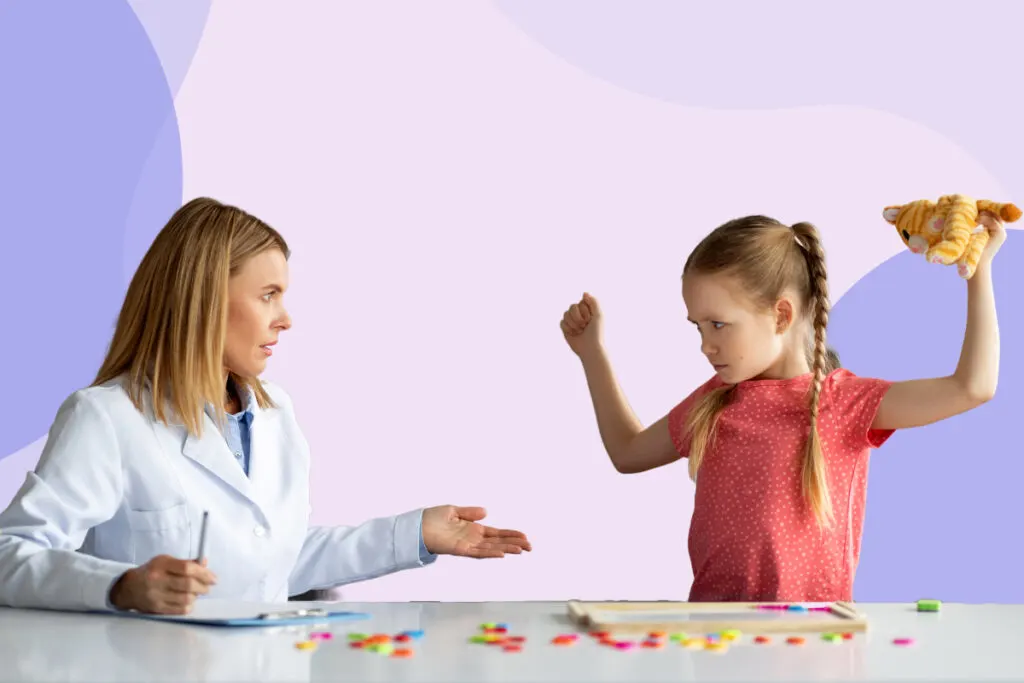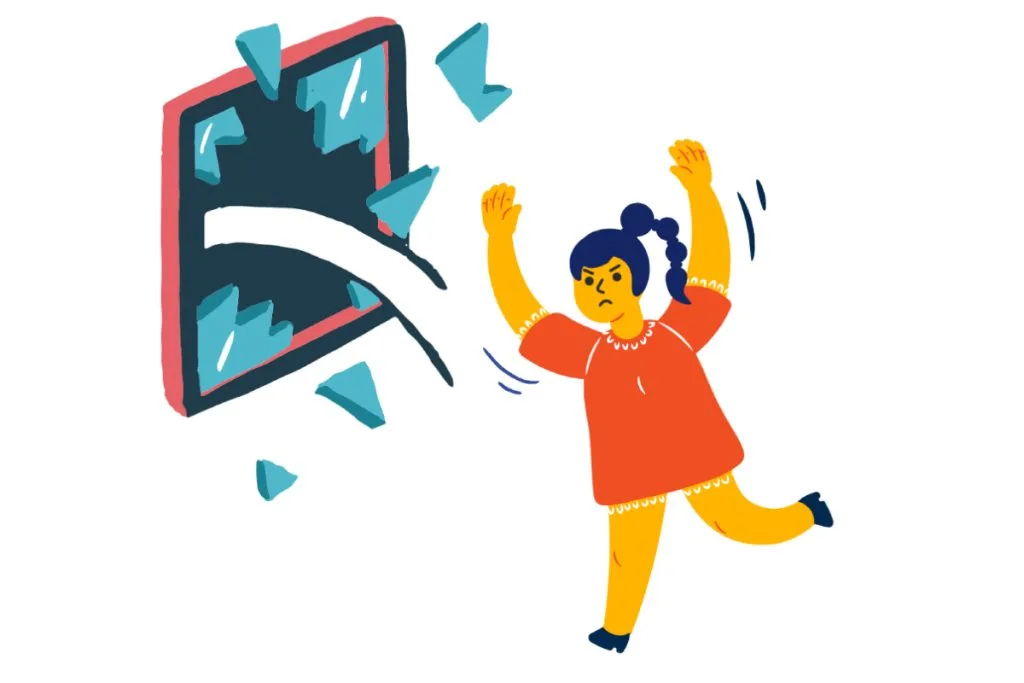TABLE OF CONTENTS
What is low frustration tolerance
Low frustration tolerance (LFT) is an inability to regulate one’s emotions when confronted with adversity, loss of control, or blocked goals. Children with a low tolerance for uncomfortable feelings usually display irritability, emotional outbursts, or temper tantrums when things go wrong.
These children often lack emotional regulation.
Due to their emotional dysregulation, they are usually misunderstood as strong-willed, spoiled, or entitled.
The result is that many of them are not given the help they need to develop proper coping and regulating skills.1
Having high frustration tolerance means the child’s ability to withstand the discomfort of negative emotions well.
Children with high frustration tolerance usually have healthy coping mechanisms for unpleasant feelings.

Causes
Frustration is a complex emotional reaction. It is caused by the interaction of multiple brain circuits involved in emotional regulation.
Scientists find that some children with low frustration tolerance have deficits within these neural circuits.2
Some babies are frustrated more quickly than others due to their innate temperament.
Easily frustrated infants tend to be less attentive and more active.
They use less effective self-regulation strategies to regulate their emotional reactivity.3
Children learn to self-regulate through co-regulating with their parents during their early childhood.
A nurturing parent can provide comfort and support to children experiencing frustrating or frightening events.
Toddlers get frustrated easily.
But warm, sensitive parenting is strongly associated with toddler emotion regulation.
Punitive and harsh parenting, however, can worsen a child’s aggression and emotional dysregulation.4
Although the presence of low frustration tolerance does not necessarily result from poor parenting, ineffective parenting can make it worse.

Signs
Infants and children who are easily frustrated show the following signs:
- Physical signs of frustration include banging, kicking, hostile anger, or other frustration-focused behaviors.
- Tantrums that are not developmentally appropriate.
- Appear more fussy.
- Poor self-soothers.
- Inflexible, intolerant to change or novelty.3
- Take fewer negative emotions or stressful events to trigger more crying.5
- Unable to handle criticism, failure, and pressure well.
- Explosive temper accompanied by aggressive, antisocial, and delinquent behavior.
- May have irrational beliefs such as catastrophization, perfectionism, blame-proneness, helplessness, etc.6
Effects
These children tend to have the following negative outcomes:
- Display oppositional defiant disorder symptoms.
- Poor school performance.
- Fewer social skills.7
- More externalizing behavior problems.
- Less support from parents and peers.
- More likely to have mental health conditions such as anxiety disorders.8
How to help a child with low frustration tolerance
Tolerate your easily frustrated child
When a child has a full-fledged meltdown because of little things, it is hard for grownups to have empathy.
We may even believe that their defiant behavior is intentional.s
However, we must stay calm and show them how we work through our frustration.
Emotion regulation is not something we are born with.
Children learn to build tolerance for frustration through observing adults regulate theirs.9
We must show them how to do it in real life, not just talk about it.
Use warm and responsive parenting
A warm and responsive parenting style enables children to develop secure attachments to their parents. It can help a frustrated kid learn how to regulate their emotions.
Warmth in parenting is also associated with healthy brain development in children and adolescents.10
Attune to their frustration
For children to learn emotional regulation, they must experience it for themselves.
The problem is children are not born with self-regulation, so we must help them get this experience first.11
Emotional attunement is one of the fastest and most effective ways to help frustrated children regulate their nervous systems.12,13
Attunement means expressing the same emotions as the child through words, facial expressions, and body language, but in a controlled way so that the child can see you understand them.14
For example, you can frown and say in a slightly stressed tone, “You’re so frustrated because you can’t open the box.”
This empathetic gesture is a co-regulation process that is essential in building frustration tolerance in children.15
Prepare & practice for potential frustration
Being disappointed can be a very frustrating experience. It’s even more frustrating when you don’t expect it.
Some children with very low frustration tolerance may have a difficult time even dealing with the thought of being disappointed.
It’s much better to address it than if the real thing hits them unexpectedly.
A child who cannot control or tolerate their rapidly escalating frustration cannot reason about their actions.
They may have no idea how to cope at the moment.
If you warn your child about something that may frustrate them and practice dealing with it, they may better control themselves in the heat of the moment.
This won’t work overnight, however.
Building those regulating neural circuits in your child’s brain takes a lot of practice. Keep practicing with them and supporting their learning.
Teach problem-solving skills
Being unable to achieve your goals, coupled with a feeling of helplessness, leads to frustration.
A proactive approach to address the root causes of distress may reduce frustration for children.16
Help them find different ways to create a different outcome despite the frustrating situation.
Give them examples of times when you or others have similar struggles and overcome them.
Frustration tolerance skills such as negotiation can help them eliminate unresolved conflicts.
Look out for signs of hunger or tiredness
Some children may be more prone to get frustrated around dinner time due to hunger.
According to a study, children who are given sugar when given challenging tasks are less likely to become frustrated.17
Emotional coaching
To prevent future meltdowns in older children, coach your child in frustration management.
Talk to them about their emotions when they are calm.
Let them talk about their feelings and listen carefully.
Discussing emotions with children rather than dismissing them can help them develop self-regulation.18
Emotion coaching from parents teaches children to recognize their emotions and provides them with coping strategies for stressful situations.
Teach coping skills
Stress can be relieved instantly by coping skills.
They include deep breathing, meditation, mindfulness, progressive muscle relaxation19, and reappraising negative thoughts for low-tolerance children.
Parenting training
Research shows that combining problem-solving skills training for children with parent management training yields significantly better results in helping children manage their frustration.20
Parent management training focuses on child-rearing practices, parent-child interactions, and contingencies that can support behavioral change in easily frustrated children.
Psychotherapy & medical help
Poor distress tolerance for kids is a common symptom for those with ADHD (Attention Deficit Hyperactivity Disorder)1 or Autism Spectrum Disorder.21
Some of them may experience extreme emotions under challenging situations.
To improve their emotional regulation skills, such children may require medical intervention.
If the impairment in children significantly affects their quality of life or that of their families, parents may seek the help of medical and mental health professionals.
References
- 1.Seymour KE, Macatee R, Chronis-Tuscano A. Frustration Tolerance in Youth With ADHD. J Atten Disord. Published online June 8, 2016:1229-1239. doi:10.1177/1087054716653216
- 2.Shaw P, Stringaris A, Nigg J, Leibenluft E. Emotion Dysregulation in Attention Deficit Hyperactivity Disorder. AJP. Published online March 2014:276-293. doi:10.1176/appi.ajp.2013.13070966
- 3.Calkins SD, Dedmon SE, Gill KL, Lomax LE, Johnson LM. Frustration in Infancy: Implications for Emotion Regulation, Physiological Processes, and Temperament. Infancy. Published online April 1, 2002:175-197. doi:10.1207/s15327078in0302_4
- 4.Dennis T. Emotional self-regulation in preschoolers: The interplay of child approach reactivity, parenting, and control capacities. Developmental Psychology. Published online 2006:84-97. doi:10.1037/0012-1649.42.1.84
- 5.Braungart-Rieker J, Stifter C. Infants’ responses to frustrating situations: continuity and change in reactivity and regulation. Child Dev. 1996;67(4):1767-1779. https://www.ncbi.nlm.nih.gov/pubmed/8890506
- 6.Martin RC, Dahlen ER. Irrational Beliefs and the Experience and Expression of Anger. Journal of Rational-Emotive & Cognitive-Behavior Therapy. Published online 2004:3-20. doi:10.1023/b:jore.0000011574.44362.8f
- 7.Zhou Q, Main A, Wang Y. The relations of temperamental effortful control and anger/frustration to Chinese children’s academic achievement and social adjustment: A longitudinal study. Journal of Educational Psychology. Published online 2010:180-196. doi:10.1037/a0015908
- 8.Mahon NE, Yarcheski A, Yarcheski TJ, Hanks MM. Relations of Low Frustration Tolerance Beliefs with Stress, Depression, and Anxiety in Young Adolescents. Psychol Rep. Published online February 2007:98-100. doi:10.2466/pr0.100.1.98-100
- 9.Morris AS, Silk JS, Steinberg L, Myers SS, Robinson LR. The Role of the Family Context in the Development of Emotion Regulation. Social Development. Published online May 2007:361-388. doi:10.1111/j.1467-9507.2007.00389.x
- 10.Morris AS, Criss MM, Silk JS, Houltberg BJ. The Impact of Parenting on Emotion Regulation During Childhood and Adolescence. Child Dev Perspect. Published online June 9, 2017:233-238. doi:10.1111/cdep.12238
- 11.Feldman R. The Development of Regulatory Functions From Birth to 5 Years: Insights From Premature Infants. Child Development. Published online March 2009:544-561. doi:10.1111/j.1467-8624.2009.01278.x
- 12.Campos JJ, Campos RG, Barrett KC. Emergent themes in the study of emotional development and emotion regulation. Developmental Psychology. Published online 1989:394-402. doi:10.1037/0012-1649.25.3.394
- 13.Evans CA, Porter CL. The emergence of mother–infant co-regulation during the first year: Links to infants’ developmental status and attachment. Infant Behavior and Development. Published online April 2009:147-158. doi:10.1016/j.infbeh.2008.12.005
- 14.Murray DW, Rosanbalm KD, Christopoulos C, Hamoudi A. Self-Regulation and Toxic Stress: Foundations for Understanding Self-Regulation from an Applied Developmental Perspective. .; 2015.
- 15.Haft WL, Slade A. Affect Attunement and Maternal Attachment: A Pilot Study. Infant Mental Health Journal. 1989;10(3):157-172.
- 16.Knaus WJ. Frustration Tolerance Training for Children. Rational Emotive Behavioral Approaches to Childhood Disorders.:133-155. doi:10.1007/0-387-26375-6_4
- 17.Benton D, Brett V, Brain PF. Glucose improves attention and reaction to frustration in children. Biological Psychology. Published online April 1987:95-100. doi:10.1016/0301-0511(87)90016-0
- 18.Dunsmore JC, Booker JA, Ollendick TH. Parental Emotion Coaching and Child Emotion Regulation as Protective Factors for Children with Oppositional Defiant Disorder. Social Development. Published online February 15, 2012:444-466. doi:10.1111/j.1467-9507.2011.00652.x
- 19.Feldman G, Greeson J, Senville J. Differential effects of mindful breathing, progressive muscle relaxation, and loving-kindness meditation on decentering and negative reactions to repetitive thoughts. Behaviour Research and Therapy. Published online October 2010:1002-1011. doi:10.1016/j.brat.2010.06.006
- 20.Kazdin AE, Siegel TC, Bass D. Cognitive problem-solving skills training and parent management training in the treatment of antisocial behavior in children. Journal of Consulting and Clinical Psychology. Published online 1992:733-747. doi:10.1037/0022-006x.60.5.733
- 21.Ek U, Fernell E, Jacobson L. Cognitive and behavioural characteristics in blind children with bilateral optic nerve hypoplasia. Acta Paediatrica. Published online October 1, 2005:1421-1426. doi:10.1080/08035250510037290
